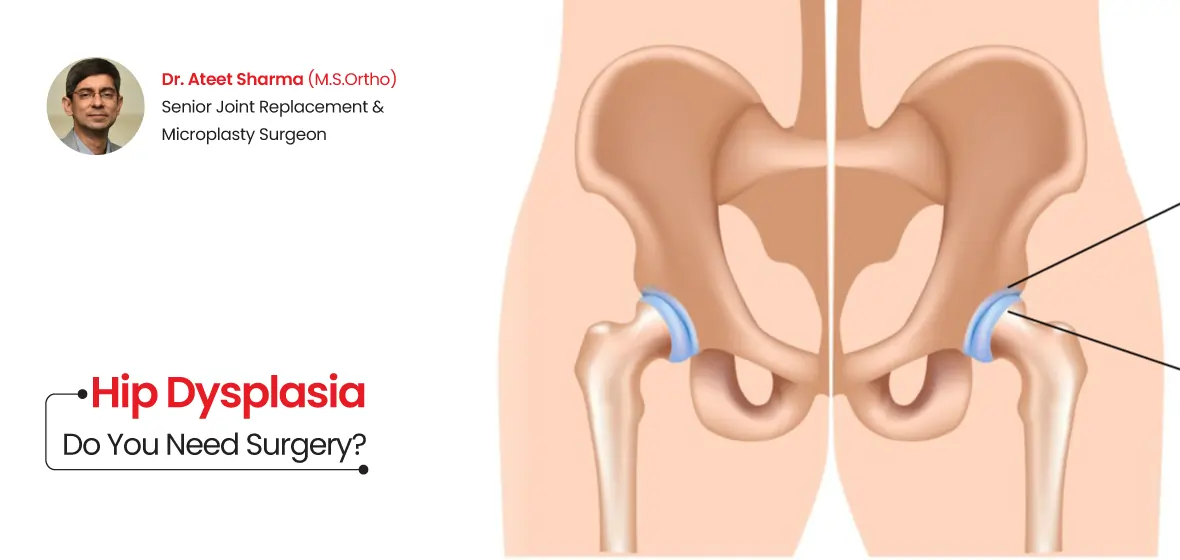
Hip Dysplasia is a condition where the bones in the hip joint do not align properly, leading to discomfort and stiffness. Furthermore, it also leads to dislocation, which is a severe problem. When the part of the hip does not fit, it might be the right time for you to go for surgery. Over time, it can lead to significant pain, and in severe cases, frequent dislocations of the hip can occur.
Our Hip Dysplasia in Ahmedabad helps you analyze the severity of your symptoms and how much the condition affects your daily life. Some cases can be resolved with physical therapy and a few home lifestyle changes. But if the pain becomes chronic, surgery may be the best option.
Remember : Prevention Is Better Than Cure
As soon as you witness this symptom, go for a doctor's consultation.
Early intervention can help you avoid complications later on.

Hip dysplasia shows various symptoms. These symptoms are differentiated based on the age of the person and the current condition.
Hip Pain : You might feel pain in front of your groin. The pain might start mild but can get severe over time.
Limping : Due to a misaligned joint, you may face hindrances in walking and mobility.
If Hip Dysplasia is not treated, it can lead to further complications. One of the risks is hip dislocation. In most cases, a dislocation happens after a severe injury like a car accident. If you suffer from hip dysplasia, your hip joint is already weaker, so dislocation can happen conveniently. This situation occurs because the muscles and ligaments around the hip are looser than normal.
All the complications can be resolved with proper guidance in the Preparation of Hip Replacement Surgery by our expert Robotic Orthopedic Surgeon - Dr Ateet Sharma.
Hip labral tears : They can damage cartilage inside the hip joint.
Osteoarthritis : It is a form of arthritis that happens when the cartilage protecting the joint wears away over time.
Unstable hip joints : It can cause pain and make it difficult to move normally.
In most cases, the diagnosis is done before babies turn six months old. In many cases, healthcare providers check for it right after a baby is born. Even without symptoms, the doctor will examine their hips at every routine check-up.
Hip Replacement Surgery is the last resort when all the other treatments do not come to the rescue. So, how can you know the right time to go for surgery?
Here are a few signs that indicate that this is the right stage where hip replacement might be necessary.
If you suffer severe pain even after consistent rest, physical therapy or medication, then it might be a clue that the condition is getting worse and you must consider surgery.
This pain may affect your daily life and routine, like walking or climbing stairs.
If basic tasks like putting on shoes or getting out of bed are becoming too painful or challenging for you to perform, then it is a sign that your hip joint is significantly damaged.
It makes the quality of life suffer because the pain in your hip will limit your activity and fun.
First, you will try non-surgical treatments—like pain relievers, injections or physical therapy. But if nothing seems to help, it may be time to talk to your doctor about hip replacement surgery.
The objective of the surgery is to remove the damaged joint and replace it with an artificial one, which gives you a new chance to enhance mobility.
If the X-rays or other tests show that the hip joint is severely damaged from osteoarthritis, rheumatoid arthritis, or an injury—your doctor might recommend surgery.
If you are experiencing any of these signs affecting your daily functionality, then it is the right time to discuss hip replacement surgery with your healthcare provider. Going for surgery can significantly improve the quality of one's life and reduce pain while doing various activities.
Medication : Pain relievers help reduce pain and inflammation.
Physical Therapy : A therapist will teach you exercises to strengthen the muscles around your hip. It improves the flexibility of the body and enhances the mobility.
Hip Injections : To tackle the situation, your doctor might give you an injection of corticosteroids into the hip joint. It helps to deal with the issue of inflammation and provides temporary pain relief.
Bracing : It is for babies. A brace or harness can help keep the hip joint in an aligned position as they grow. Bracing is an effective measure if started early.
The surgical options are segregated into three major categories :
The surgery helps remove the worn-out joint and install a new synthetic joint. It can reduce the pain to a significant level and improve mobility.
Non-surgical treatment options are usually the first step to dealing with any hip pain circumstances. But if it does not turn out to be an effective option for pain relief, then surgical options may be necessary to restore hip function and relieve pain. Our Hip Replacement Treatment in Ahmedabad is done with the most care and advanced expertise of the surgeon so that you will not have to worry about the final output or the result.
© 2025 Dr.Ateet Sharma All rights reserved. | Manage by Nexus